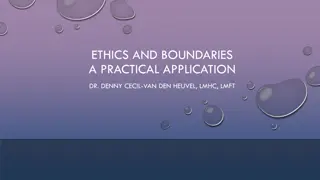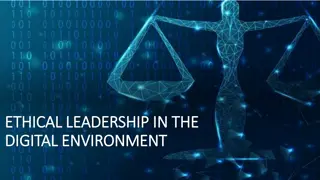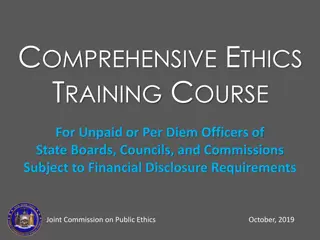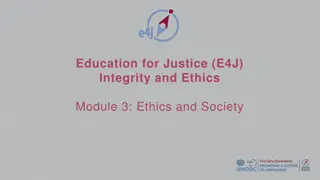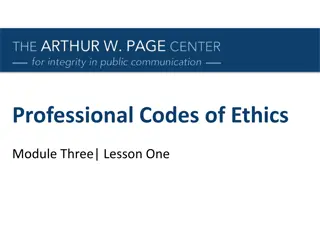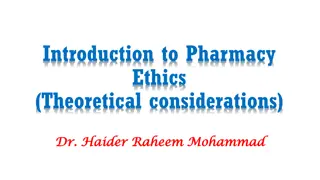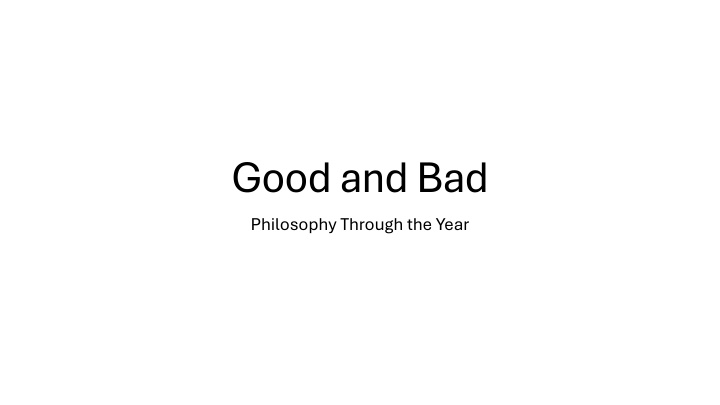
Exploring Evolutionary Ethics and Morality in Philosophy
Delve into the complexities of morality through the lens of philosophy, questioning the nature of being moral in a world where nature itself is not inherently moral. This exploration investigates the evolution of ethics, biological foundations of morality, and key terminology related to cooperation and altruism. Discover thought-provoking insights from renowned philosophers like Nietzsche and Levinas on the importance of understanding and transcending conventional moral constructs.
Download Presentation

Please find below an Image/Link to download the presentation.
The content on the website is provided AS IS for your information and personal use only. It may not be sold, licensed, or shared on other websites without obtaining consent from the author. If you encounter any issues during the download, it is possible that the publisher has removed the file from their server.
You are allowed to download the files provided on this website for personal or commercial use, subject to the condition that they are used lawfully. All files are the property of their respective owners.
The content on the website is provided AS IS for your information and personal use only. It may not be sold, licensed, or shared on other websites without obtaining consent from the author.
E N D
Presentation Transcript
Good and Bad Philosophy Through the Year
Why be moral, when nature is not moral? - Nietzsche everyone will readily agree that it is of the highest importance to know whether we are not duped by morality. - Levinas
Evolution and Ethics Philosophy Through the Year: Good and Bad London Jesuit Centre
The evolution of morality Features of humans that relevant to morality, and which might be open to (or require!) evolutionary explanation: Sacrificial or altruistic behaviour(good for you; risky or costly for me) e.g. in animals: alarm raising; food sharing; flea-picking (conscious motive/rationale not important); how would this have ever been selected? how would this have ever been selected? Other-regarding sensitivity; e.g. feeling distress when other individuals suffer; Taboo, obligations, social prohibition (senseor feeling) e.g. disgust at sibling sexual contact; anger at defection ; guilt/shame in response to anger Judgements (thoughtor concept) e.g. conscious condemnation of defection ; retribution; law, etc.
A biological basis for morality? Possible examples of a biological basis for other aspects of human existence: - Sexuality: seemingly based on given instincts, but the form these take is shaped by culture, individual up-bringing, habitual behaviour of individual, and decisions/life-choices; - Language: infants seem to possess innate faculty of language acquisition that remarkably outstrips input; but, there is no naturallanguage; - Eating/diet: popularity of sugary/fatty foods evidence of universal human patterns of appetite; but enormous divergences in eating habits/diet, etc. - Maths: method for calculating circumference of a circle discovered by brains that have evolved; but truths of geometry seem to be independent of biology
Some terminology Co-operation (or prosocial/helping behaviour ) behaving in a way that benefits another individual (Joyce 2006: 13) Fitness sacrificing (sometimes referred to as altruism / evolutionary altruism ) behaving in a way that advances another s reproductive fitness, at the expense of one s own reproductive fitness (Joyce 2006: 13) Altruism acting with the intention of benefitting another individual where this is motivated by a non-instrumental concern for his or her welfare Joyce 2006: 14)
The evolution of sacrificial/altruistic behaviour Theories of evolution of behaviour involve considerations of conflicts of interest and trade-offs , e.g. White Pelican. Mother s interest: - raise successful offspring (dependent on any successful offspring); - do so at minimal cost. Chick 1 s interest: -survive (dependent on mother) Chick 2 s interest: -survive (dependent on mother)
The evolution of morality Options in evolutionary explanation of morality (i.e. how might those features be explained): Group selection? perhaps co-operative groups are more likely to survive but can groups ever the unit of selection, or only ever individuals? or genes? Kin selection and inclusive fitness explains why genes that produce sacrificial caring behaviour towards kin may be selected Reciprocal altruism behaviour of other individuals constitutes environment , so behaviour may be advantageous in virtue of the responses of others, not just because of immediate benefit; relies on theoretical constructs to assess the long-term success of different behavioural strategies in interaction with other strategies; e.g. prisoners dilemma /game theory.
The evolution of sacrificial/altruistic behaviour Important things to note: behaviour can be considered as part of the nature of given species; behaviour has a physiological basis (involves brain and body) ... which can be inherited and might be advantageous (increase chance of successful reproduction); THEREFORE could be shaped by natural selection BUT!... the relationship between genes and behaviour is complex (unlikely to be a gene for very sophisticated behaviour) understanding of how genetic make-up relates to behaviour is still developing; and behaviour can be inherited in non-genetic ways (e.g. mimicry, social learning, cultural transmission)
The evolution of sacrificial/altruistic behaviour Forms of behaviour can be described as strategies ; ways of interacting with the environment. So the question is: if new/modified forms of strategy couldarise through variation + mutation; and if more altruistic/sacrificial/co-operative strategies could emerge in a population in this way; how would such strategies be selected ? or: under what conditions would they be evolutionarily under what conditions would they be evolutionarily advantageous (i.e. liable to increase chance of successful advantageous (i.e. liable to increase chance of successful offspring) offspring)
Evolution and moral consciousness Why do we like sweet things? calories enjoyment of sugar natural selection
Evolution and moral consciousness Why do we avoid wrongdoing ? co-operation sense of prohibition natural selection
Evolution and moral consciousness Why do we make moral judgements? co-operation desire to punish defection natural selection
The benefit of morality As we have seen, the question of how morality is good for us is philosophically interesting . Connection between goodness and flourishing ( eudaemonia ) But sense that moral action requires sacrifice/renunciation, or focus on the good of others; Why be moral? might mean what good is it to me to do what is right? Dualism of practical reason, etc.
Moral judgements What makes a moral judgement moral? (see James 2011: 50-56) 1. Sense of prohibition prohibition that is 2. 2. distinct distinct and independent from disinclination 3. and conventions conventions 4. that can motivate motivate actions 5. and implies desert/need for punishment 6. and is linked to affective affective responses (e.g. anger; guilt, etc.) disinclination/desire punishment
Evolution and moral judgement The wrongness of an action is apparently grounded on something more, something transcendent. This fits perfectly with the suggestion above that the recognition of moral wrongness halts further deliberation; it overrides our decision making. Someone whose moral judgements did depend on his desires in this way would run a serious risk of undermining his reputation by acting in anti-social ways whenever his desires overwhelmed him. In general, individuals could so easily back out of their commitments or steal from their neighbours or murder their enemies simply because their desires shifted would have a substantially more difficult time making and keeping co-operative arrangements. (James 2011: 63)
The Darwinian dilemma for moral realism
Sharon Streets Darwinian Dilemma The Darwinian Dilemma arises when we ask about the connection between the evolutionary story about the origin of morality (moral capacities), and these stance independent truths: The challenge for realist theories of value is to explain the relation between these evolutionary influences on our evaluative attitudes, on the one hand, and the independent evaluative truths that realism posits, on the other. (109)
Sharon Streets Darwinian Dilemma The dilemma: If there is no connection between selective pressures that produce moral attitudes, and stance-independent moral truths, then we should be sceptical about moral beliefs; at best we can expect a lucky strike connection the two; But if there is a relation, then what is it? Every possible answer turns out to be implausible, unnecessary or unclear (i.e. there no good reasons to think that the ability to actually grasp moral truths would ever be favoured by natural selection).
Moral realism What is meant by moral realism? If one is a moral realist, one must hold that evaluative truths hold independently, not just of particular evaluative judgements, but of the whole set of evaluative judgements. (Street 2006: 111) So the thing that unites realists about value is the view that that there are evaluative facts or truths that hold independently of all our evaluative attitudes [. . .]
Moral realism There are, of course, lots of ways of being a moral realist, which involve different kinds of metaphysical commitments, e.g.: Platonic/Platonic-Christian; where something is good insofar as it participates in, or resembles, some transcendent goodness Divine command; where is something is good insofar as it conforms to the will of God, which is Good. Kantian; where goodness is the principle of a free, rational will, which is outside the empirical, phenomenal realm But each of these have their own particular problems; moral realism is But each of these have their own particular problems; moral realism is already philosophically problematic for reasons that have nothing to do already philosophically problematic for reasons that have nothing to do with evolution with evolution
Sharon Streets Darwinian Dilemma With some reservations, Street argues that we have good reasons to think that our evaluative tendencies have been shaped by evolution. To begin with, it is very obvious that some evaluative judgements would have an effect on a creature s survival, for example: 1. The fact that something would promote one s survival is a reason in favour of it; This is explained very simply: creatures that did not see things this way would be unlikely to survive.
Sharon Streets Darwinian Dilemma What about other evaluative judgements? 2. The fact that something would promote the interests of a family member is a reason to do it; 3. We have greater obligations to help our own children than we do to help complete strangers; 4. The fact that someone has treated one well is a reason to treat that person well in return; 5. The fact that someone is altruistic is a reason to admire, praise or reward him or her; 6. The fact that someone has done one deliberate harm is a reason to shun that person or seek his or her punishment. These evaluative attitudes seem to be near-universal in human cultures (115).
Sharon Streets Darwinian Dilemma Not only is this the case in human cultures, but we find very similar phenomenon in our primate relatives: at some basic motivational level, chimpanzees seem to experience the fact that another chimpanzee has helped them, whether by sharing food, grooming them, or supporting their position within the group hierarchy, as counting in favour of assisting that other individual in similar ways. (117) And so it makes sense to say that our own more complicated evaluative judgements are conscious, reflective endorsements of more basic evaluative tendencies that we share with other animals. (117)
Sharon Streets Darwinian Dilemma So, even if we should be wary about drawing too many conclusions about the evolution of evaluative judgements, it seems likely that they are, to some degree, a result of evolutionary pressures: The influence of Darwinian selective pressures on the content of human evaluative judgements is best understood as indirect. The most plausible picture is that natural selection has had a tremendous direct influence on what I have called our more basic evaluative tendencies and that these basic evaluative tendencies, in their turn, have had a major influence on the evaluative judgements that we affirm. (120)
Sharon Streets Darwinian Dilemma So, this being the case, we face a dilemma First horn: If there is no connection between the evolutionary pressures that produced evaluative tendencies, and moral truths then we should not expect evolution to reliably produce creatures whose evaluative judgements grasped those truths;
Sharon Streets Darwinian Dilemma If moral truths have nothing to do with guiding our evolutionary path, then we have no reason to think that our evolutionary path would lead us to independent moral truths at all: We should have been evolving towards affirming the independent evaluative truths posited by the realist, but instead it turns out that we have been evolving towards affirming whatever evaluative content tends to promote reproductive success. We have thus been guided by the wrong sort of influence from the very outset of our evaluative history, and so, more likely than not, most of our evaluative judgements have nothing to do with the truth. (124) (Worse still, we wouldn t even necessarily be able to diagnose the error, because we only have our evolved capacities to work with!)
Sharon Streets Darwinian Dilemma Second horn: If there is a relation, what is it? Most answers seem scientifically implausible. The most likely contender is that it is a tracking relation According to this hypothesis, our ability to recognize evaluative truths, like the cheetah s speed and the giraffe s long neck, conferred upon us certain advantages that helped us to flourish and reproduce. Thus, the forces of natural selection that influenced the shape of so many of our evaluative judgements need not and should not be viewed as distorting or illegitimate at all. For the evaluative judgements that it proved most selectively advantageous to make are, in general, precisely those evaluative judgements which are true. (126)
Sharon Streets Darwinian Dilemma Unfortunately, the tracking account doesn t do too well as an explanation, because it is much more complicated than the alternative: We can explain the evaluative tendencies without any reference to the actual truth of moral judgements; beliefs about fairness don t have to be true to be advantageous And also less clear: We don t have any clear idea of what we mean by these moral truths , and so the whole picture becomes obscure; but we do understand what we mean by advantageous So overall, there is no need to posit a tracking relation ; the purely adaptive account works fine without it. All things being equal, we should prefer a simpler account (law of parsimony).
Sharon Streets Darwinian Dilemma Moral realist tracking account: Moral realist tracking account: Humans have a tendency to shun those who cheat their neighbours; It is true that is wrong to cheat one s neighbours; The capacity to recognise this truth, and act accordingly was advantageous to our ancestors; This tendency was advantageous to our ancestors. Therefore the capacity to recognise the truth, and act accordingly was selected. Purely adaptive account: Purely adaptive account: Humans have a tendency to shun those who cheat their neighbours; This tendency was advantageous to our ancestors; Therefore this tendency was selected.
Sharon Streets Darwinian Dilemma Furthermore, the adaptive link account gives better answers to other aspects of the moral landscape, for example, preference for kin and species-bias: Why do we tend to judge that we have special obligations to care for our children, rather than strangers or distant relatives? Why do we tend to view the killing of other human beings as a much more serious matter than the killing of other plants or animals? The adaptive link account has very good answers to such questions, of the general form that ancestors who made evaluative judgements of these kinds, and who as a result tended to respond to their circumstances in the ways demanded by these judgements, did better in terms of reproductive success than their counterparts. [. . .] Now compare the tracking account s explanation. It tries to answer these same questions by saying that these judgements are true: that survival is valuable, that we do have special obligations to care for our children, that the killing of human beings is more serious than the killing of plants or other animals. (132).
Responses to the Darwinian dilemma
What about moral non-realism? What are the alternatives to realism? Some well-known non- realist theories of moral language, e.g.: Emotivism; Where theft is wrong expresses an attitude or feeling, and is held to mean I disapprove of theft Prescriptivism; Where theft is wrong expresses an imperative, and is held to mean do not steal Some kind of relativism; Where theft is wrong expresses the beliefs held in common by a particular culture, and means something like we disapprove of theft In each case, the wrongness does not exist outside of a subjective state of affairs: the fact of having certain feelings; the desire to prescribe or forbid certain things. The wrongness is dependent upon these facts; but these facts are contingent in some way.
Problems with non-realism But these theories have a number of well-known problems, related to our moral intuitions: They seem to mean that moral statements are not about anything; If stealing is bad just means I don t like stealing , then I am just saying something about myself. But this does not seem right They seem to rule out moral disagreement; Because if we are both talking about our own subjective states, then we are really talking about different things, hence not disagreement. But this also seems wrong They can t give an account of deep experiences like remorse, or moral horror; When feeling deep remorse, it seems as though I have woken up to how things really are, not simply changed my mind about something
Problems with non-realism But Michael Ruse suggests that our intuitions about the objectivity of morality are just what we would expect if moral intuitions were adaptive! [T]he evolutionist points out that there are good (biological) reasons why it is part of our nature to objectify morality. If we did not regard it as binding, we would ignore it. It is precisely because we think that morality is more than mere subjective desires, that we are led to obey it. (Ruse 1986: 103)
What about moral non-realism? But there also are approaches where the moral realities in question are not exactly stance-independent, but equally something more than subjective expression, e.g.: Contractualism; Where theft is wrong is based on implicit agreement and is held to mean We have (perhaps implicitly) agreed not to steal Eudaemonism; Where theft is wrong is based on consideration of the kind of flourishing that characterises human beings, and is held to mean theft prevents human beings from reaching their telos In these cases, the wrongness of a particular act depends on objective states of affairs: the fact of having entered into an agreement or contract; the fact of being a creature with a certain kind of nature (see Allhoff 2009). But this state of affairs is not independent of the creatures themselves.
References ALLHOFF, F. (2009). The Evolution of the Moral Sentiments and the Metaphysics of Morals. Ethical Theory and Moral Practice. 12, 97- 114. JOYCE, R. (2007). The Evolution of Morality. Cambridge, Mass, MIT Press. JAMES, S. M. (2011). An Introduction to Evolutionary Ethics. Chichester, West Sussex, U.K., Wiley-Blackwell. RUSE, M. (1986). EVOLUTIONARY ETHICS: A PHOENIX ARISEN. Zygon. 21, 95-112. SINGER, P. (1984). Ethics and Sociobiology. Zygon. 19, 141-158. STREET, S. (2006). A Darwinian Dilemma for Realist Theories of Value. Philosophical Studies: An International Journal for Philosophy in the Analytic Tradition. 127, 109-166.

